-
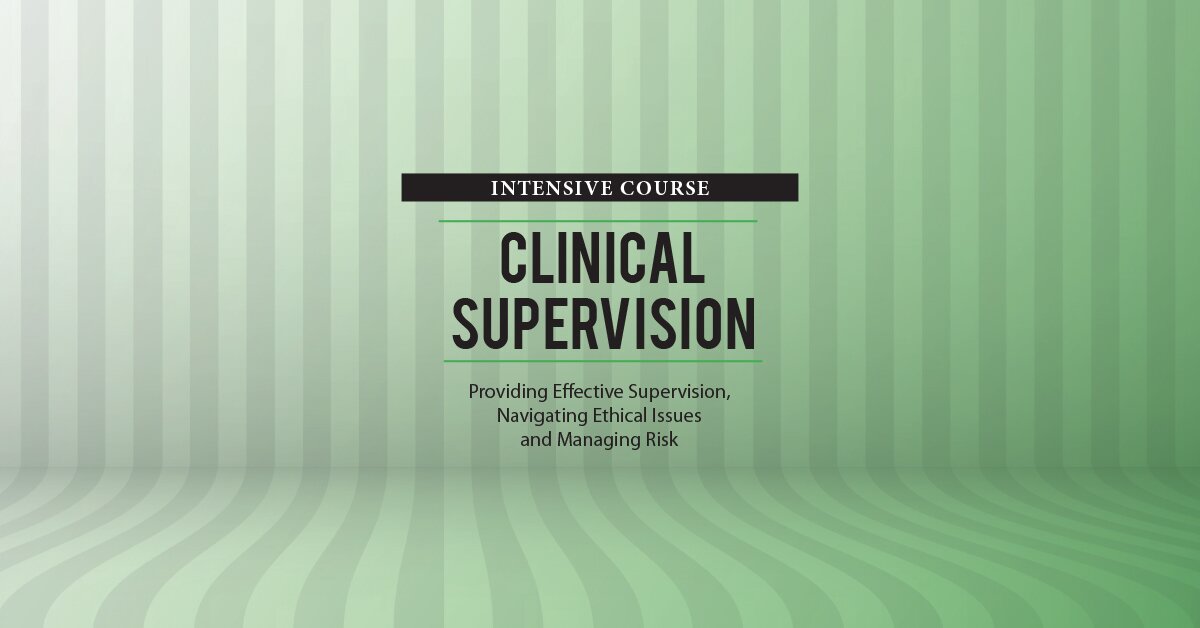
George Haarman – 2 Day Intensive Course: Clinical Supervision: Providing Effective Supervision, Navigating Ethical Issues and Managing Risk
- Faculty:
- George Haarman
- Duration:
- 11 Hours 58 Minutes
- Format:
- Audio and Video
- Copyright:
- Feb 10, 2020
Description
This two-day recording was developed for experienced, post-graduate, licensed clinicians who are interested in or have been providing clinical supervision. It is an intermediate level course designed to introduce practitioners to best practices for providing clinical supervision.
The presentation reviews models of clinical supervision and discusses the advantages and disadvantages of each model, details building blocks for the provision of competent supervision, discusses individual versus group supervision, suggests various observation models to enhance feedback, and demonstrates constructive feedback strategies.
As supervision is often a multicultural experience, potential supervisors are taught to identify personal values, biases, and expectations and utilizes skills, techniques, and strategies for supervising diverse populations. Every discipline recognizes the importance of clinical supervision in training new practitioners and has established specific guidelines related to supervision. This recording reviews the major ethical issues involved in supervision, discusses key legal issues associated with supervision, and provides specific risk management strategies to address these ethical and legal issues.
This experiential, in-depth recording details the supervisory process, answers your questions about ethical issues, risk, and liability, and prepares you to deliver competent clinical supervision.
Handouts
| Manual – Intensive Course: Clinical Supervision (1.74 MB) | 127 Pages | Available after Purchase | |
| Transcript – Day 1 (526.7 KB) | 140 Pages | Available after Purchase | |
| Transcript – Day 2 (525.2 KB) | 135 Pages | Available after Purchase |
Outline
Getting Started: How to Optimize the Initial Supervision Sessions
- Establish roles and responsibilities
- How to write a comprehensive Informed Consent Agreement and Supervisory Contract
- Setting clear expectations for supervision
- Documentation: If it’s not in writing, it didn’t happen
- Types of supervision: Individual, group, team, peer, case consultation
- Practice Exercise: Writing a Supervisory contract for Ned Newbie
The Supervisory Alliance: Building a Foundation for Everyone’s Success
- 10 myths about clinical supervision
- Supervision versus consultation
- Must-have knowledge, skills and attitude of the competent supervisor
- 10 factors contributing to the “best” and “worst” supervisors
- The Supervisee’s Bill of Rights
- The Building Blocks of Effective Supervision:
- Competency
- Diversity
- Supervisee relationship
- Professionalism
- Assessment/evaluation/feedback
- Practice Exercise: Competency-Based Supervisor Self-Assessment
Models of Clinical Supervision: Find the Right Fit for You and Your Setting
- Administrative versus clinical supervision
- Models of supervision:
- The “No-Model” model
- Apprentice-master
- Expert
- One-size-fits all
- Psychotherapy-based
- Parallel process
- Interactional
- Relationship
- Developmental
- Holistic
The Evaluation Process: The Key to Effective Supervision
- Legal and ethical implications
- Formats, methods, and techniques
- Formative evaluation versus summative evaluation
- 6 steps for handling a negative evaluation
Give Effective Feedback: Having Hard Conversations
- Six guiding principles for giving feedback
- How to structure constructive feedback
- Improve your constructive feedback skills
- ”Unhelpful” constructive feedback
- Practice Exercise: Role Play – The Supervisor From Hell Provides Feedback To The Problematic Supervisee
- Practice Exercise: Role Play – The Constructive and Effective Supervisor Meets the Open Supervisee with an Issue
When Problems Arise: Resolve Supervisor/Supervisee Tensions
- The 8000 pound elephant in the room
- 20 practical prevention strategies to avoid problems
- Common problems in supervision
- How to assess for supervisee limitations and impairment
- Strategies for dealing with an impaired supervisee
- Impairment and gatekeeping
- How to write a Professional Development Plan
- Practice Exercise: Writing a Performance Improvement Plan for Peter Problematica
Cultural Competence: Proactive Treatment of Cultural Differences
- When the supervisor-supervisee dyad is impacted
- Methods for introducing the topic of multicultural differences
- A continuum of cultural competence
- Cultural humility
Ethical and Legal Issues in Supervision: Protect Yourself, Your License, Your Agency and Your Client
- Legal primer for mental health practitioners
- Standard of Care for supervision
- Supervisory negligence/malpractice
- Who’s responsible? Direct and vicarious liability
- Ten activities required for ethical supervision
- Core ethical principles
- Supervisory ethical violations
- Major ethical issues related to supervision
- Competence
- Due process
- Informed consent
- Confidentiality
- Multiple/dual relationships
- And more!
- Boundary crossings versus boundary violations
- Sexual misconduct
- Social boundaries: Factors to consider
- Limitations of the research and potential risks
Faculty
George Haarman, PsyD, LMFT Related seminars and products: 3
George B. Haarman, PsyD, LMFT, is a Licensed Clinical Psychologist and a Licensed Marriage and Family Therapist with over 40 years of experience working in a variety of settings, including private practice, youth detention centers, juvenile group homes, child protective services, and juvenile probation. Dr. Haarman completed basic and advanced supervisor training required by the Kentucky Board of Psychology Examiners and maintains approval by the Board to act as a supervisor. In his private practice, he has provided clinical supervision to clinical and counseling practicum students as well as consultation about clinical supervision to psychologists for over 25 years.
Dr. Haarman is a national speaker on clinical supervision, depression, school refusal, ADHD, emotional disorders in children and adults, and the DSM-5®. He is the author of three books: Clinical Supervision: Legal, Ethical, and Risk Management Issues, School Refusal: Children Who Can’t or Won’t Go to School, and Mastering DSM-5®. Dr. Haarman received his doctorate in clinical psychology from Spalding University in 1989. He has been an instructor at Jefferson Community College, Bellarmine University, and Spalding University.
Speaker Disclosures:
Financial: George Haarman is in private practice. He receives a speaking honorarium from PESI, Inc.
Non-financial: George Haarman is a member of the American Psychological Association; and the Kentucky Psychological Association.
Instant Access Available
Downloadable Content

Get Instant Download George Haarman – 2 Day Intensive Course: Clinical Supervision: Providing Effective Supervision, Navigating Ethical Issues and Managing Risk at Offimc.click Now!
Delivery Information
- Upon ordering the product, a delivery email with download instructions will be sent immediately to you so that you may download your files. If you log in (or create an account) prior to purchase you will also be able to access your downloads from your account dashboard.
- It is a digital download, so please download the order items and save them to your hard drive. In case the link is broken for any reason, please contact us and we will resend the new download link to you.
- If you don't receive the download link, please don’t worry about that. We will update and notify you as soon as possible from 8:00 AM – 8:00 PM (UTC+8).
- Please Contact Us if there are any further questions or concerns you may have. We are always happy to assist!



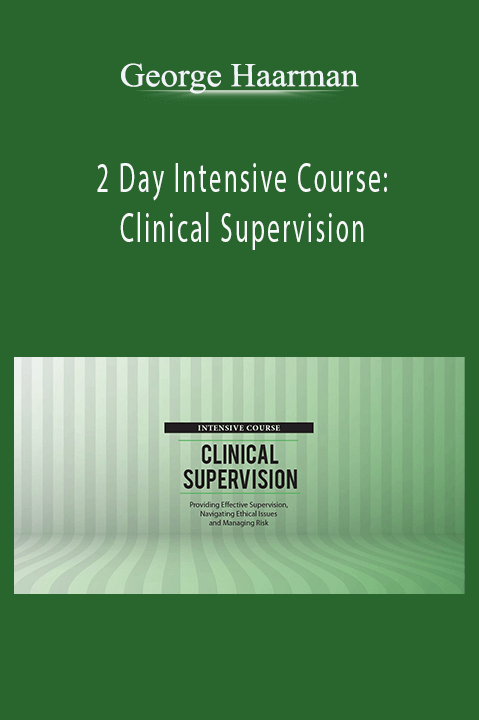




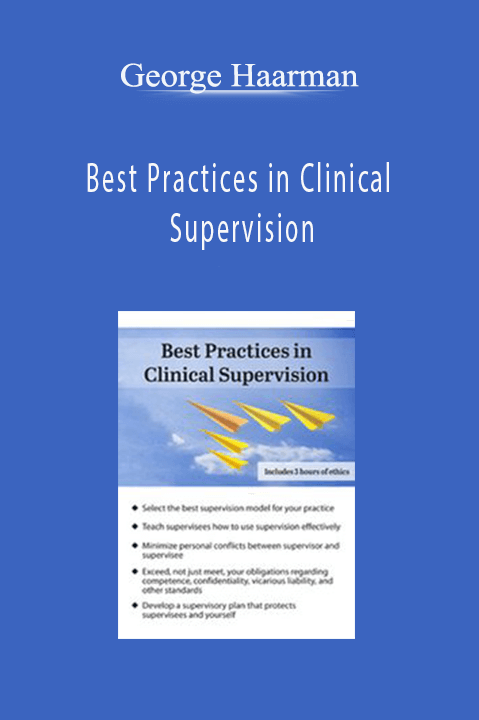
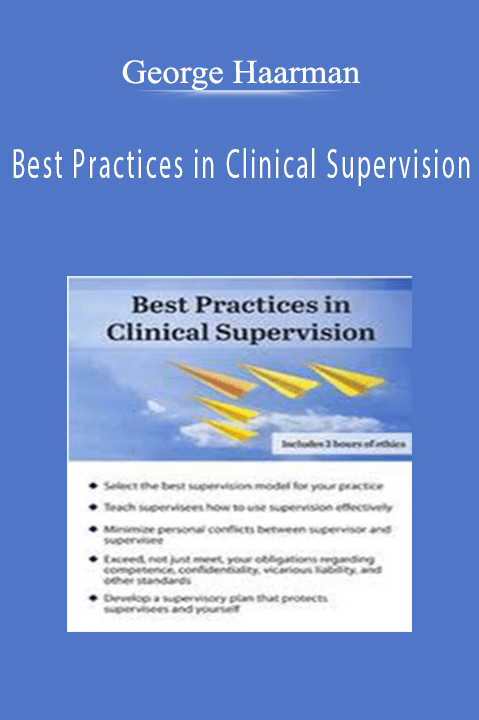

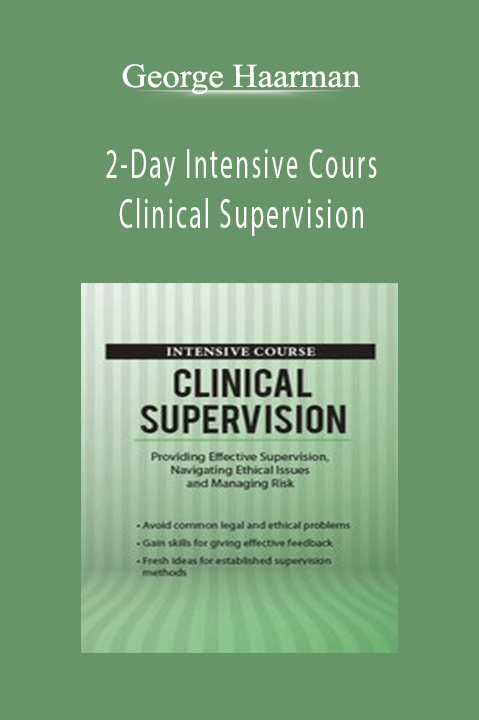

8 reviews for 2 Day Intensive Course: Clinical Supervision: Providing Effective Supervision, Navigating Ethical Issues and Managing Risk – George Haarman
There are no reviews yet.